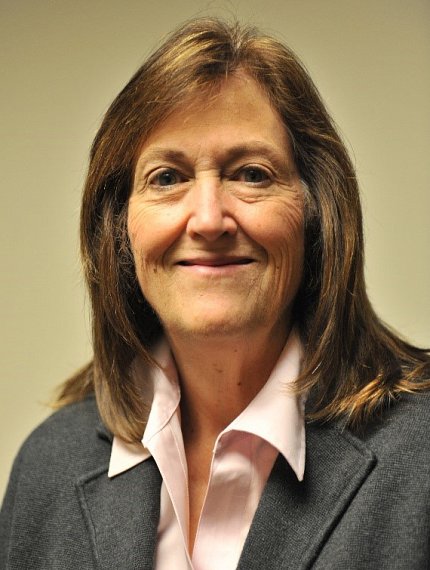NIAMS’s Nelson Retires, Reflects on Family’s Multigenerational Ties to NIH

Many consider NIH to be like a family, but for Melinda Nelson, it was even more true. Retiring from NIAMS after 45 years at NIH, she is part of three generations in her family to forge a career here.
Nelson retired on Apr. 1 as director of NIAMS’s Office of Extramural Operations, where since 2018 she has overseen the administrative operations of the extramural program, including grants management, peer review and clinical trials.
Nelson graduated from the University of Maryland with a degree in behavioral and social sciences and no particular career path in mind. Her mother, Kim Barrett, a long-time NIH’er who retired from NCI in 1992, suggested Nelson try working for NIH because “NIH is a wonderful place.”
“My mother was a single mom in the 1960s who gave us a very stable upbringing in Bethesda,” Nelson says. “I knew NIH was a place that could offer stability, a good career path and fulfilling and interesting work.”
Barrett, a biologist, once worked in an NCI laboratory, but after developing severe allergies to the lab animals, had to leave. Ten years later, with three children, she called her former boss to ask his advice on getting back into NIH in a non-lab capacity. He suggested Barrett talk to someone in the NCI Research Analysis and Evaluation Office, which he thought could benefit from her scientific background. She was offered a job analyzing and classifying the science content of all institute-supported research projects.
Nelson’s first NIH job in 1977 was as a grants technical assistant in the Division of Research Grants (now CSR). During the interview, her degree seemed less important to the interviewers than her ability to type. She joined a study section where she typed handwritten summary statements, or “pink sheets,” so called because of the pink paper they were printed on.
In 1980, Nelson took a job as a grants management specialist at NICHD where she stayed for 20 years, enjoying the interaction with grantees. There are several career paths at NIH where a non-scientist can go far, but she says, “grants management is a helping profession that really lets you get involved in the science.”
Nelson has always enjoyed being part of the grants management community. When she started, there were only about 150 grants management specialists at NIH.
“There was a time when I knew almost everybody [in grants management], and they knew me,” she recalls. “In the 1980s, the community was largely made up of women specialists while the grants management officers were men. That has changed dramatically with many women now in leadership roles.”

Nelson feels fortunate to have been able to travel around the U.S. and Puerto Rico on site visits with NICHD and for meetings of the Society of Research Administrators. “It was extremely insightful to be able to sit down with grantees and discuss issues they were having, and then figure out where NIH could help and clearly make an impact,” she says.
In 1999, Nelson became NIAMS deputy grants management officer and a year later rose to chief. She developed many memorable relationships with her grantees. For example, Dr. Carolyn Cohen of Brandeis University, who held an R01 at NIAMS for 39 years, would call Nelson and say, “Daahr-ling, you are the only one who can help me understand [some grant issue].” About her interactions with Cohen, Nelson says, “I truly knew I was helping a brilliant, funded scientist feel a little less like NIH was a black hole. That is what makes me most proud.”
Recognizing the value of centralized training for all grants managers, Nelson started the “NIH Orientation Boot Camp 101,” the first of many classes in a larger Grants Management University program she founded almost 20 years ago.
Nelson’s mentoring efforts have not gone unnoticed. In 2014, she received the Ruth L. Kirschstein Award for Mentoring “for exemplary performance while demonstrating significant leadership, skill and ability in serving as a mentor.”
Erik Edgerton, NIAMS chief grants management officer, says, “[Nelson] is the reason I have a career in grants management. She often pushed me and others to stretch beyond our comfort zones professionally while also taking a genuine interest in us personally, always encouraging us to grow and learn. She would often help me see things from a perspective I may have missed. Her absence will be felt throughout NIH and the larger research administration community.”
Nelson’s family legacy continues. Her daughter Sarah is now a grants management specialist at NIAAA. “I saw how my grandmother and mother had such fulfilling careers at the NIH,” Sarah says. “I also wanted a career where I could serve a greater purpose in the community and one that offered an opportunity to develop a new skillset, so I decided to pursue it for myself.”
Nelson’s granddaughter, 4-year-old Lily, enjoys science and told Nelson that she had recently learned that skin is the largest organ in the human body. Nelson says, “Maybe she’s also a future NIH’er.”
